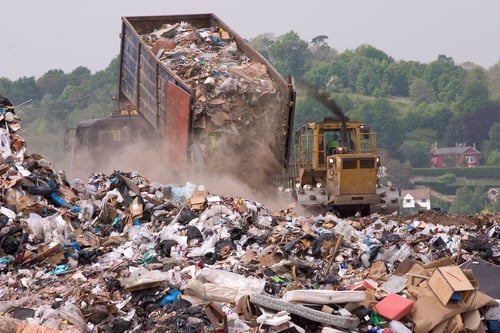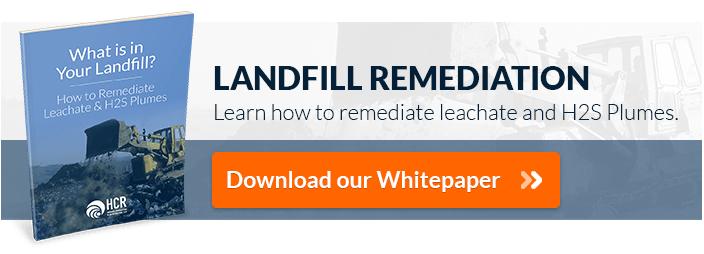
Landfill sites are not pretty. Unfortunately, the problem is bigger than just the sight of huge piles of waste. There are many health and environmental issues that are presented by landfill waste:
Problem #1: Toxins
A lot of the different materials that end up in landfills contain toxins that are eventually released and seep into the soil and groundwater. These substances are major hazards to the environment and can last for several years. For example, think of electronics such as computers, batteries and televisions that get thrown out and end up in landfills. These products contain substances like arsenic, acids, lead and others which eventually end up in our environment and pose threats to public health.
Mercury is another toxic substance that frequently appears in landfills. It comes from fluorescent light bulbs and poses major health risks. Inhaling even a small amount of mercury vapor can harm our kidneys and cause respiratory failure.
Solution #1: Treating Toxins
Newer landfills are being constructed with synthetic membranes to prevent mercury from escaping into soil and groundwater. Instead, the toxins are drained through a collection of pipes and discharged into a sewer system where they can be retained, incinerated or converted into fertilizer.
Problem #2: Leachate
Leachate is a liquid that forms when landfill waste breaks down and water filters through that waste and picks up toxins. Rain falling on the top of the landfill is the greatest contributor of leachate. In other cases, groundwater entering the landfill can produce leachate as well. As liquid seeps through the landfill and collects decomposed waste components, chemical reactions take place and produce a toxic leachate “cocktail.” Chemicals commonly found in leachate include:
- Methane
- Carbon Dioxide
- Organic Acids
- Alcohols
- Aldehydes
- More
Solution #2: Treating Leachate
There are a range of technologies available to treat landfill leachate in different ways. These include:
- Biological Treatment – This is usually the first step in treating landfill leachate. It involves using many different filters to remove nitrogen and other biological compounds from the wastewater.
- Chemical-Physical Processes – Wet oxidation processes can be used if it is possible to oxidize organic compounds. This includes activated carbon adsorption, precipitation, flocculation and ion exchange processes among others.
Problem #3: Greenhouse Gas
Organic materials such as food scraps and yard waste are usually compacted when they are put into a landfill. The problem is that this removes oxygen and causes the material to break down anaerobically. Over time, the process will produce methane: a type of greenhouse gas that is 20 times more potent than carbon dioxide and wreaks havoc on our environment. Methane is also flammable and can be very dangerous in large concentrations.
Solution #3: Treating Greenhouse Gas
New landfills are being lined with a membrane that is specially designed to catch methane in liquid form and prevent it from escaping into the air. However, it is still not possible to capture 100% of it. There are a number of treatment processes that can help prevent methane production:
- Open Window or Tunnel Composting – This uses aerobic digestion to decompose organic matter without creating methane gas.
- In-vessel Composting – This is a type or aerobic treatment that occurs in a closed container to facilitate the breakdown of waste by micro-organisms.
Other processes are available that use anaerobic digestion within a confined space. This allows the methane to be captured and converted into energy.
Conclusion
Aside from the financial impacts, waste that is buried in a landfill will break down slowly and present problems for future generations. There are several well-established techniques available to reliably and consistently treat landfill wastes.



